Refugee Acceptance: International Relations Report Analysis
VerifiedAdded on 2020/03/16
|8
|2071
|61
Report
AI Summary
This report delves into the complexities of international relations concerning refugee acceptance, analyzing the varying policies adopted by different nations. It examines the definition of a refugee according to the UN convention, the historical context of asylum rooted in Western culture, and the concept of natural rights. The report explores the obligations of countries under international law, as well as the economic and cultural factors influencing refugee acceptance, including the impact of the 1951 Refugee Convention. It discusses the challenges faced by refugees, the role of international organizations, and the impact of events like the Syrian crisis on refugee flows. The report concludes by highlighting the diverse responses of governments, the geopolitical power dynamics, and the importance of addressing financial and resource constraints related to refugee resettlement, emphasizing the need for varied policies based on specific regional situations.
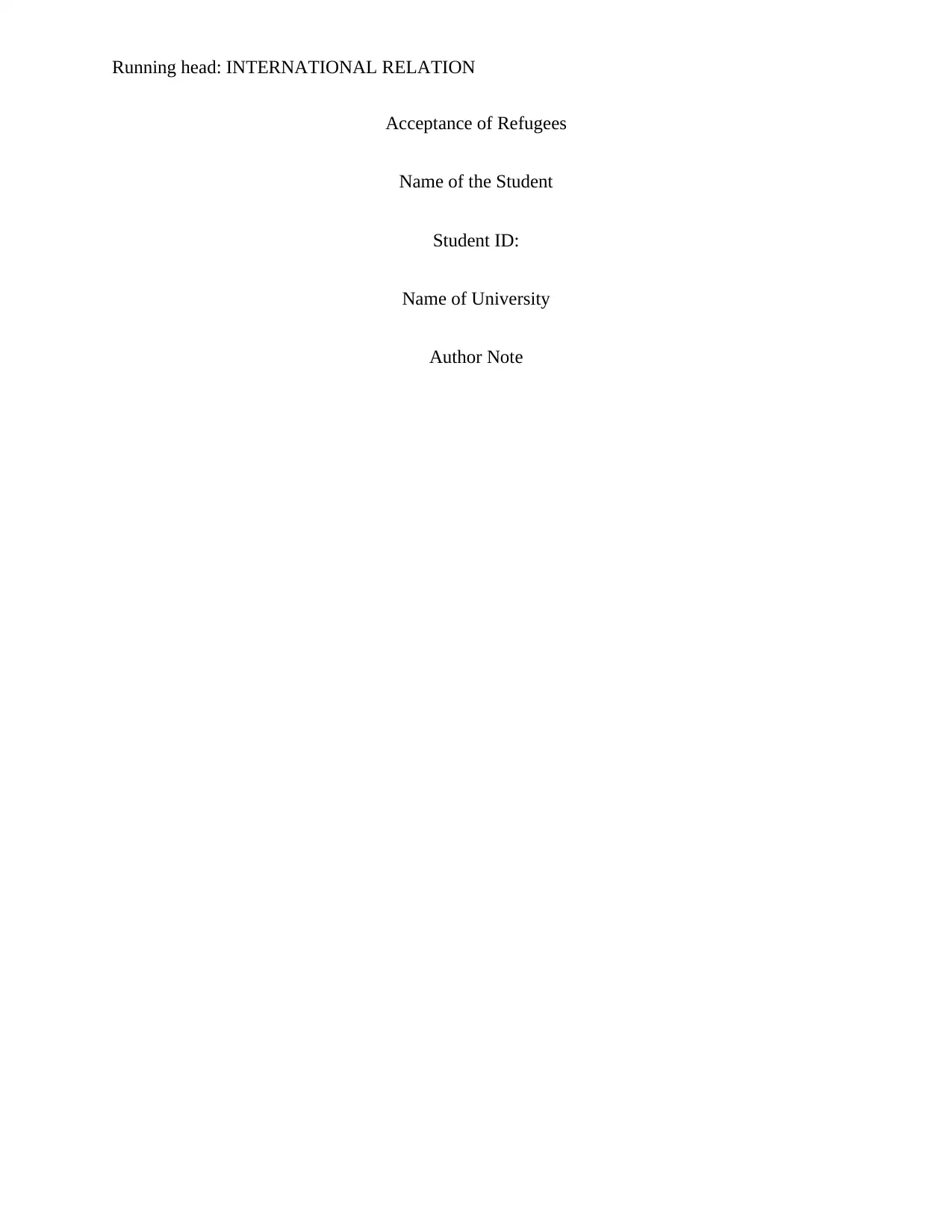
Running head: INTERNATIONAL RELATION
Acceptance of Refugees
Name of the Student
Student ID:
Name of University
Author Note
Acceptance of Refugees
Name of the Student
Student ID:
Name of University
Author Note
Paraphrase This Document
Need a fresh take? Get an instant paraphrase of this document with our AI Paraphraser
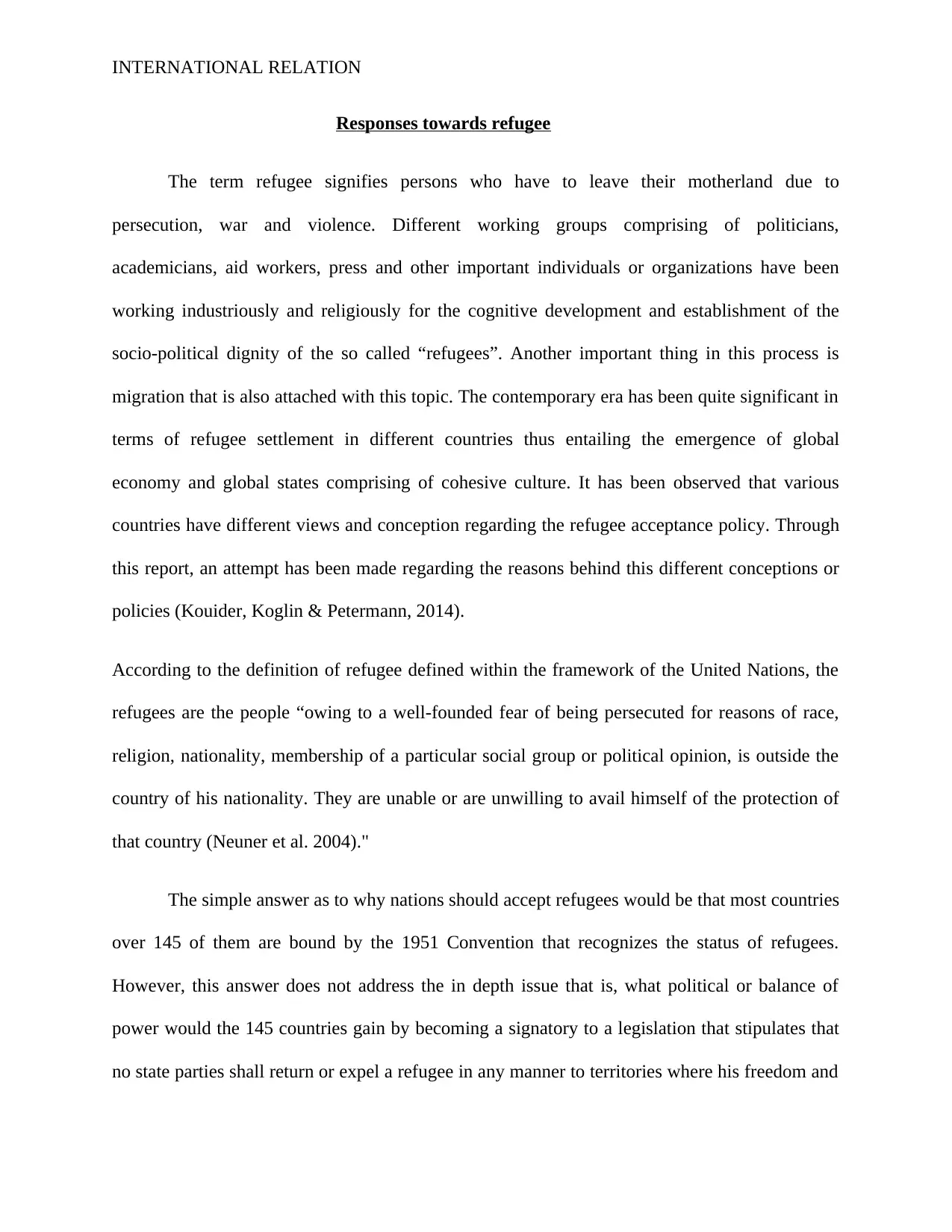
INTERNATIONAL RELATION
Responses towards refugee
The term refugee signifies persons who have to leave their motherland due to
persecution, war and violence. Different working groups comprising of politicians,
academicians, aid workers, press and other important individuals or organizations have been
working industriously and religiously for the cognitive development and establishment of the
socio-political dignity of the so called “refugees”. Another important thing in this process is
migration that is also attached with this topic. The contemporary era has been quite significant in
terms of refugee settlement in different countries thus entailing the emergence of global
economy and global states comprising of cohesive culture. It has been observed that various
countries have different views and conception regarding the refugee acceptance policy. Through
this report, an attempt has been made regarding the reasons behind this different conceptions or
policies (Kouider, Koglin & Petermann, 2014).
According to the definition of refugee defined within the framework of the United Nations, the
refugees are the people “owing to a well-founded fear of being persecuted for reasons of race,
religion, nationality, membership of a particular social group or political opinion, is outside the
country of his nationality. They are unable or are unwilling to avail himself of the protection of
that country (Neuner et al. 2004)."
The simple answer as to why nations should accept refugees would be that most countries
over 145 of them are bound by the 1951 Convention that recognizes the status of refugees.
However, this answer does not address the in depth issue that is, what political or balance of
power would the 145 countries gain by becoming a signatory to a legislation that stipulates that
no state parties shall return or expel a refugee in any manner to territories where his freedom and
Responses towards refugee
The term refugee signifies persons who have to leave their motherland due to
persecution, war and violence. Different working groups comprising of politicians,
academicians, aid workers, press and other important individuals or organizations have been
working industriously and religiously for the cognitive development and establishment of the
socio-political dignity of the so called “refugees”. Another important thing in this process is
migration that is also attached with this topic. The contemporary era has been quite significant in
terms of refugee settlement in different countries thus entailing the emergence of global
economy and global states comprising of cohesive culture. It has been observed that various
countries have different views and conception regarding the refugee acceptance policy. Through
this report, an attempt has been made regarding the reasons behind this different conceptions or
policies (Kouider, Koglin & Petermann, 2014).
According to the definition of refugee defined within the framework of the United Nations, the
refugees are the people “owing to a well-founded fear of being persecuted for reasons of race,
religion, nationality, membership of a particular social group or political opinion, is outside the
country of his nationality. They are unable or are unwilling to avail himself of the protection of
that country (Neuner et al. 2004)."
The simple answer as to why nations should accept refugees would be that most countries
over 145 of them are bound by the 1951 Convention that recognizes the status of refugees.
However, this answer does not address the in depth issue that is, what political or balance of
power would the 145 countries gain by becoming a signatory to a legislation that stipulates that
no state parties shall return or expel a refugee in any manner to territories where his freedom and
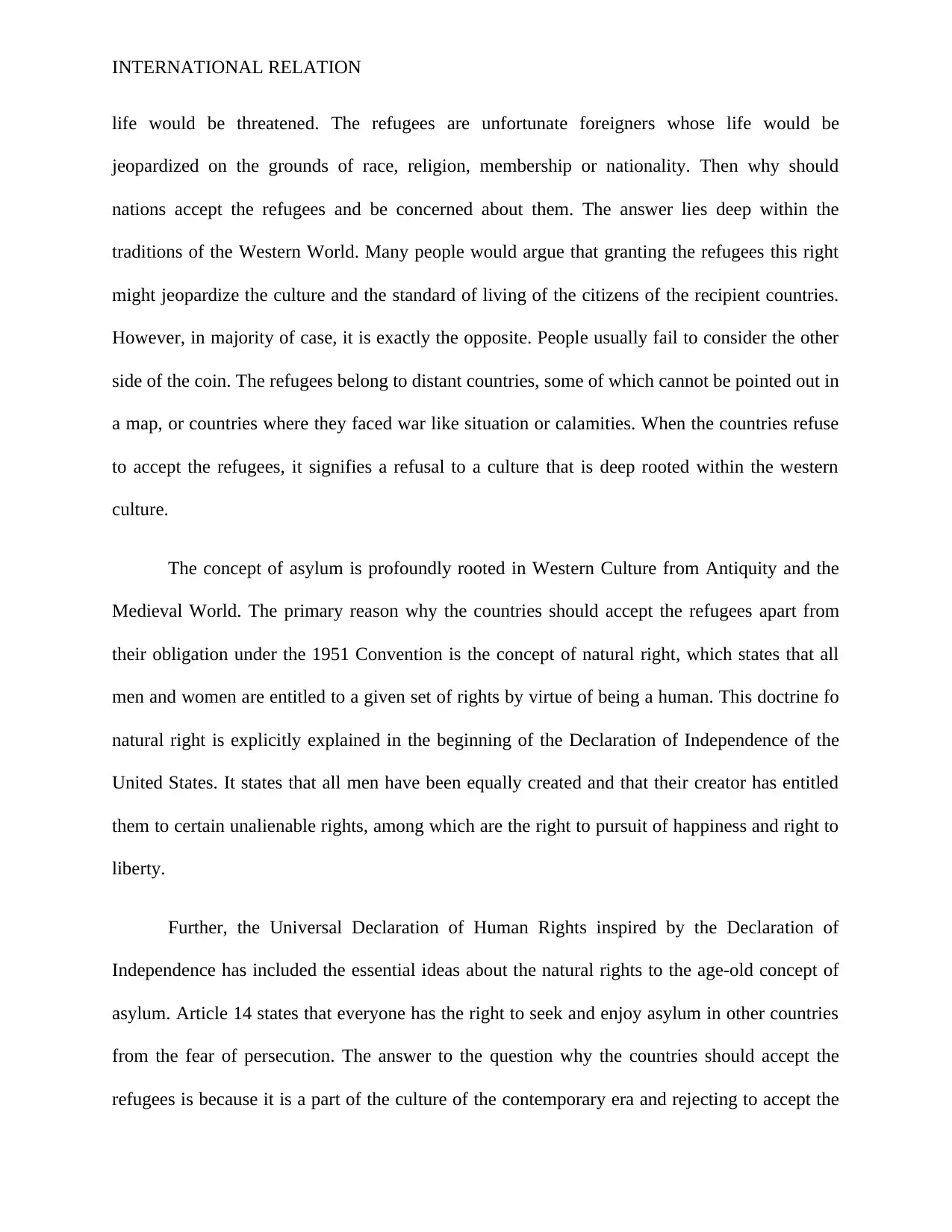
INTERNATIONAL RELATION
life would be threatened. The refugees are unfortunate foreigners whose life would be
jeopardized on the grounds of race, religion, membership or nationality. Then why should
nations accept the refugees and be concerned about them. The answer lies deep within the
traditions of the Western World. Many people would argue that granting the refugees this right
might jeopardize the culture and the standard of living of the citizens of the recipient countries.
However, in majority of case, it is exactly the opposite. People usually fail to consider the other
side of the coin. The refugees belong to distant countries, some of which cannot be pointed out in
a map, or countries where they faced war like situation or calamities. When the countries refuse
to accept the refugees, it signifies a refusal to a culture that is deep rooted within the western
culture.
The concept of asylum is profoundly rooted in Western Culture from Antiquity and the
Medieval World. The primary reason why the countries should accept the refugees apart from
their obligation under the 1951 Convention is the concept of natural right, which states that all
men and women are entitled to a given set of rights by virtue of being a human. This doctrine fo
natural right is explicitly explained in the beginning of the Declaration of Independence of the
United States. It states that all men have been equally created and that their creator has entitled
them to certain unalienable rights, among which are the right to pursuit of happiness and right to
liberty.
Further, the Universal Declaration of Human Rights inspired by the Declaration of
Independence has included the essential ideas about the natural rights to the age-old concept of
asylum. Article 14 states that everyone has the right to seek and enjoy asylum in other countries
from the fear of persecution. The answer to the question why the countries should accept the
refugees is because it is a part of the culture of the contemporary era and rejecting to accept the
life would be threatened. The refugees are unfortunate foreigners whose life would be
jeopardized on the grounds of race, religion, membership or nationality. Then why should
nations accept the refugees and be concerned about them. The answer lies deep within the
traditions of the Western World. Many people would argue that granting the refugees this right
might jeopardize the culture and the standard of living of the citizens of the recipient countries.
However, in majority of case, it is exactly the opposite. People usually fail to consider the other
side of the coin. The refugees belong to distant countries, some of which cannot be pointed out in
a map, or countries where they faced war like situation or calamities. When the countries refuse
to accept the refugees, it signifies a refusal to a culture that is deep rooted within the western
culture.
The concept of asylum is profoundly rooted in Western Culture from Antiquity and the
Medieval World. The primary reason why the countries should accept the refugees apart from
their obligation under the 1951 Convention is the concept of natural right, which states that all
men and women are entitled to a given set of rights by virtue of being a human. This doctrine fo
natural right is explicitly explained in the beginning of the Declaration of Independence of the
United States. It states that all men have been equally created and that their creator has entitled
them to certain unalienable rights, among which are the right to pursuit of happiness and right to
liberty.
Further, the Universal Declaration of Human Rights inspired by the Declaration of
Independence has included the essential ideas about the natural rights to the age-old concept of
asylum. Article 14 states that everyone has the right to seek and enjoy asylum in other countries
from the fear of persecution. The answer to the question why the countries should accept the
refugees is because it is a part of the culture of the contemporary era and rejecting to accept the
⊘ This is a preview!⊘
Do you want full access?
Subscribe today to unlock all pages.

Trusted by 1+ million students worldwide
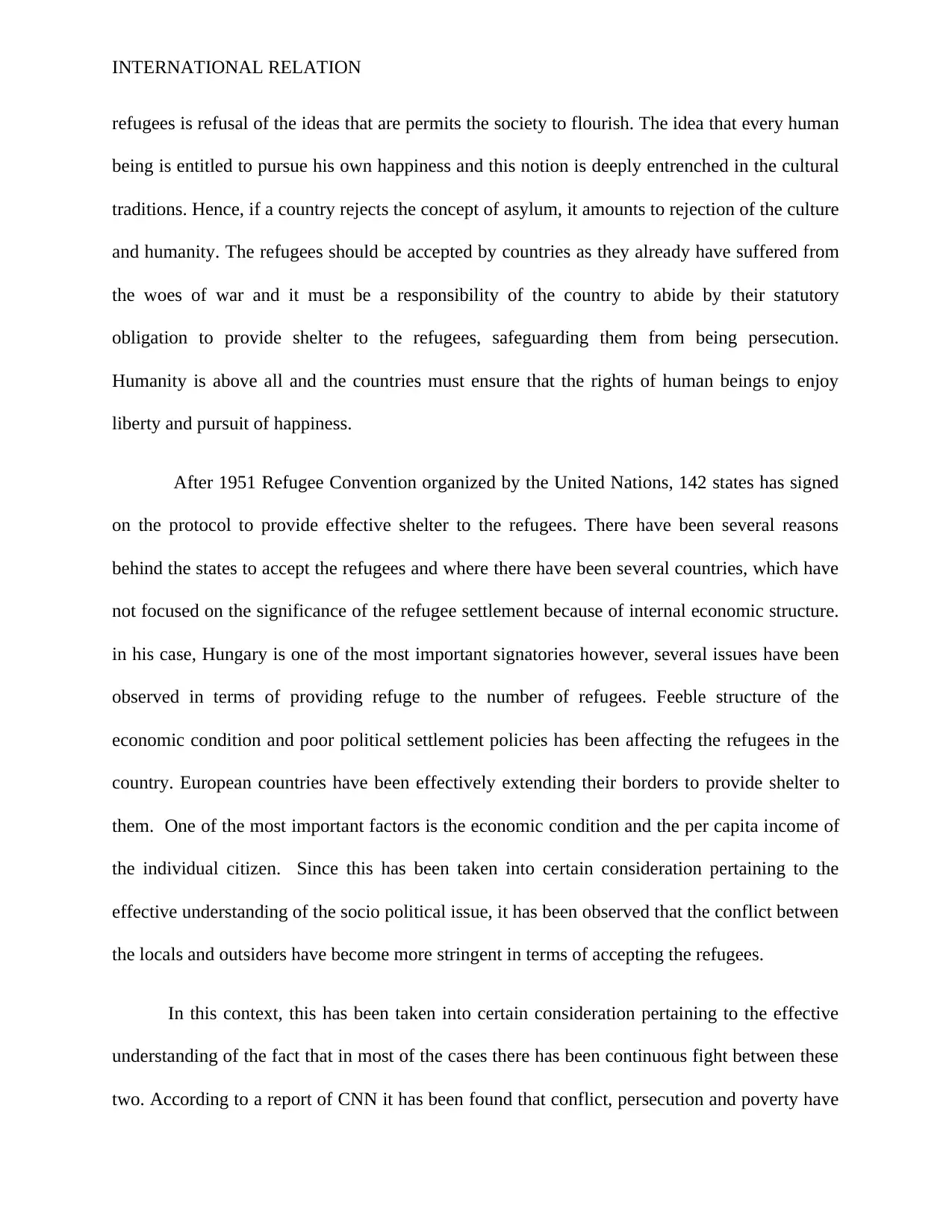
INTERNATIONAL RELATION
refugees is refusal of the ideas that are permits the society to flourish. The idea that every human
being is entitled to pursue his own happiness and this notion is deeply entrenched in the cultural
traditions. Hence, if a country rejects the concept of asylum, it amounts to rejection of the culture
and humanity. The refugees should be accepted by countries as they already have suffered from
the woes of war and it must be a responsibility of the country to abide by their statutory
obligation to provide shelter to the refugees, safeguarding them from being persecution.
Humanity is above all and the countries must ensure that the rights of human beings to enjoy
liberty and pursuit of happiness.
After 1951 Refugee Convention organized by the United Nations, 142 states has signed
on the protocol to provide effective shelter to the refugees. There have been several reasons
behind the states to accept the refugees and where there have been several countries, which have
not focused on the significance of the refugee settlement because of internal economic structure.
in his case, Hungary is one of the most important signatories however, several issues have been
observed in terms of providing refuge to the number of refugees. Feeble structure of the
economic condition and poor political settlement policies has been affecting the refugees in the
country. European countries have been effectively extending their borders to provide shelter to
them. One of the most important factors is the economic condition and the per capita income of
the individual citizen. Since this has been taken into certain consideration pertaining to the
effective understanding of the socio political issue, it has been observed that the conflict between
the locals and outsiders have become more stringent in terms of accepting the refugees.
In this context, this has been taken into certain consideration pertaining to the effective
understanding of the fact that in most of the cases there has been continuous fight between these
two. According to a report of CNN it has been found that conflict, persecution and poverty have
refugees is refusal of the ideas that are permits the society to flourish. The idea that every human
being is entitled to pursue his own happiness and this notion is deeply entrenched in the cultural
traditions. Hence, if a country rejects the concept of asylum, it amounts to rejection of the culture
and humanity. The refugees should be accepted by countries as they already have suffered from
the woes of war and it must be a responsibility of the country to abide by their statutory
obligation to provide shelter to the refugees, safeguarding them from being persecution.
Humanity is above all and the countries must ensure that the rights of human beings to enjoy
liberty and pursuit of happiness.
After 1951 Refugee Convention organized by the United Nations, 142 states has signed
on the protocol to provide effective shelter to the refugees. There have been several reasons
behind the states to accept the refugees and where there have been several countries, which have
not focused on the significance of the refugee settlement because of internal economic structure.
in his case, Hungary is one of the most important signatories however, several issues have been
observed in terms of providing refuge to the number of refugees. Feeble structure of the
economic condition and poor political settlement policies has been affecting the refugees in the
country. European countries have been effectively extending their borders to provide shelter to
them. One of the most important factors is the economic condition and the per capita income of
the individual citizen. Since this has been taken into certain consideration pertaining to the
effective understanding of the socio political issue, it has been observed that the conflict between
the locals and outsiders have become more stringent in terms of accepting the refugees.
In this context, this has been taken into certain consideration pertaining to the effective
understanding of the fact that in most of the cases there has been continuous fight between these
two. According to a report of CNN it has been found that conflict, persecution and poverty have
Paraphrase This Document
Need a fresh take? Get an instant paraphrase of this document with our AI Paraphraser
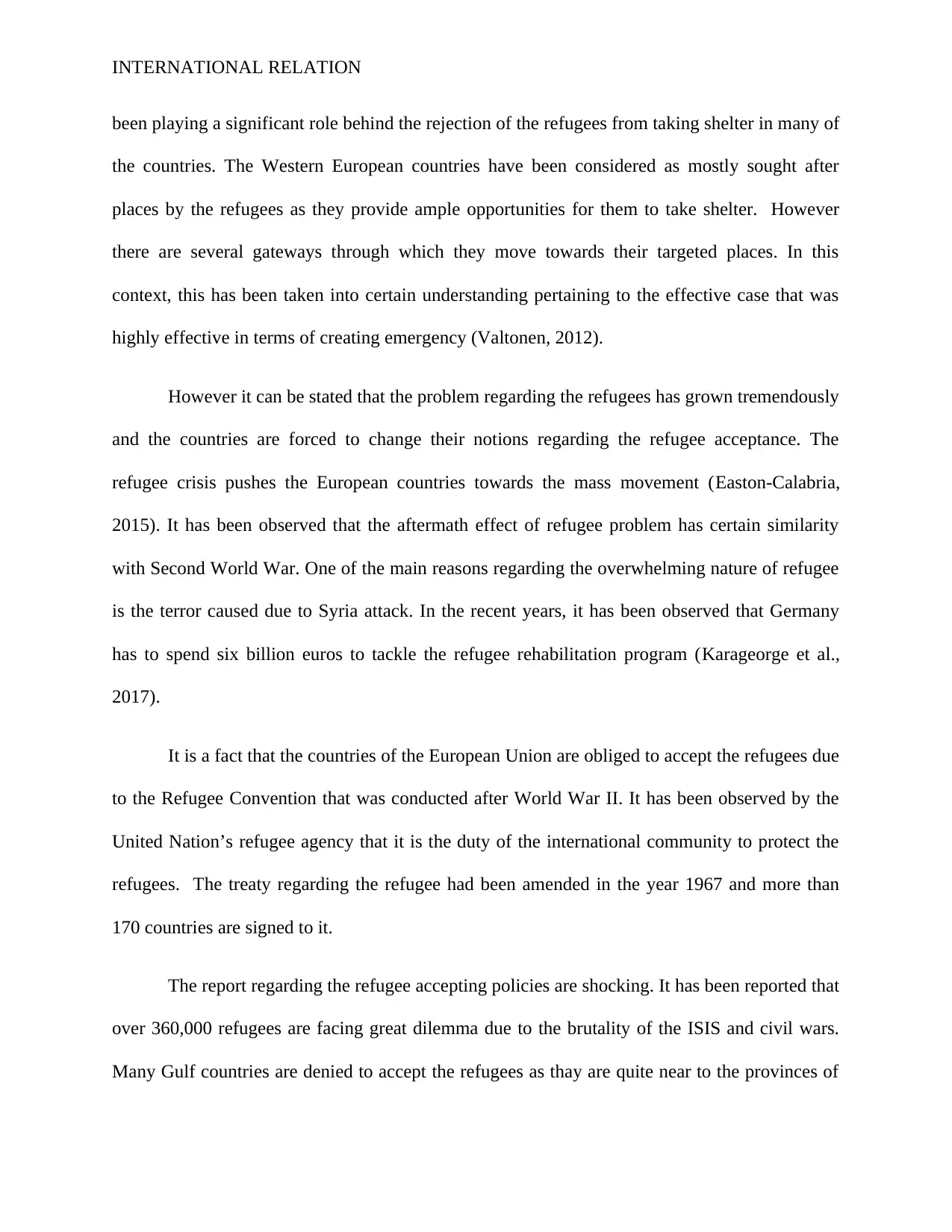
INTERNATIONAL RELATION
been playing a significant role behind the rejection of the refugees from taking shelter in many of
the countries. The Western European countries have been considered as mostly sought after
places by the refugees as they provide ample opportunities for them to take shelter. However
there are several gateways through which they move towards their targeted places. In this
context, this has been taken into certain understanding pertaining to the effective case that was
highly effective in terms of creating emergency (Valtonen, 2012).
However it can be stated that the problem regarding the refugees has grown tremendously
and the countries are forced to change their notions regarding the refugee acceptance. The
refugee crisis pushes the European countries towards the mass movement (Easton-Calabria,
2015). It has been observed that the aftermath effect of refugee problem has certain similarity
with Second World War. One of the main reasons regarding the overwhelming nature of refugee
is the terror caused due to Syria attack. In the recent years, it has been observed that Germany
has to spend six billion euros to tackle the refugee rehabilitation program (Karageorge et al.,
2017).
It is a fact that the countries of the European Union are obliged to accept the refugees due
to the Refugee Convention that was conducted after World War II. It has been observed by the
United Nation’s refugee agency that it is the duty of the international community to protect the
refugees. The treaty regarding the refugee had been amended in the year 1967 and more than
170 countries are signed to it.
The report regarding the refugee accepting policies are shocking. It has been reported that
over 360,000 refugees are facing great dilemma due to the brutality of the ISIS and civil wars.
Many Gulf countries are denied to accept the refugees as thay are quite near to the provinces of
been playing a significant role behind the rejection of the refugees from taking shelter in many of
the countries. The Western European countries have been considered as mostly sought after
places by the refugees as they provide ample opportunities for them to take shelter. However
there are several gateways through which they move towards their targeted places. In this
context, this has been taken into certain understanding pertaining to the effective case that was
highly effective in terms of creating emergency (Valtonen, 2012).
However it can be stated that the problem regarding the refugees has grown tremendously
and the countries are forced to change their notions regarding the refugee acceptance. The
refugee crisis pushes the European countries towards the mass movement (Easton-Calabria,
2015). It has been observed that the aftermath effect of refugee problem has certain similarity
with Second World War. One of the main reasons regarding the overwhelming nature of refugee
is the terror caused due to Syria attack. In the recent years, it has been observed that Germany
has to spend six billion euros to tackle the refugee rehabilitation program (Karageorge et al.,
2017).
It is a fact that the countries of the European Union are obliged to accept the refugees due
to the Refugee Convention that was conducted after World War II. It has been observed by the
United Nation’s refugee agency that it is the duty of the international community to protect the
refugees. The treaty regarding the refugee had been amended in the year 1967 and more than
170 countries are signed to it.
The report regarding the refugee accepting policies are shocking. It has been reported that
over 360,000 refugees are facing great dilemma due to the brutality of the ISIS and civil wars.
Many Gulf countries are denied to accept the refugees as thay are quite near to the provinces of
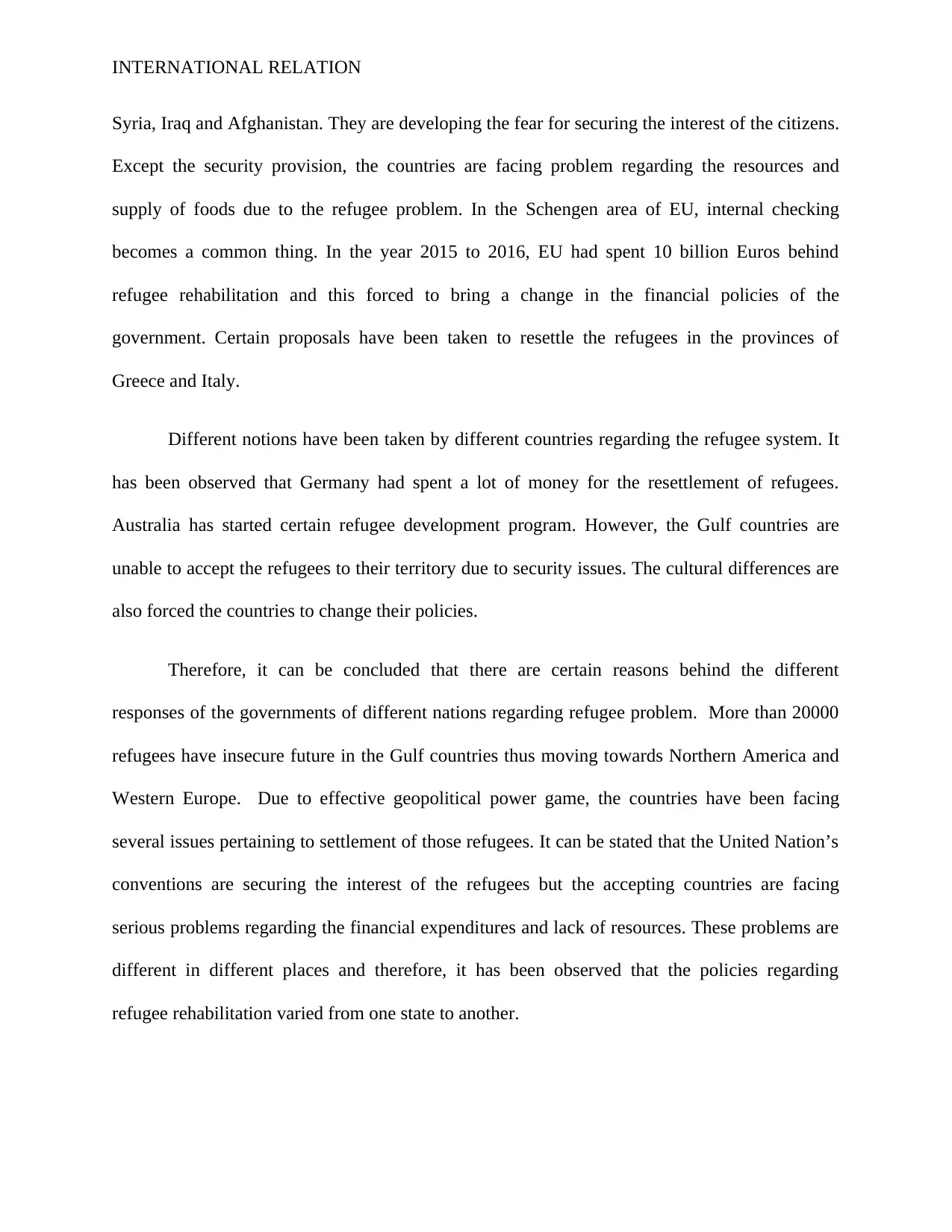
INTERNATIONAL RELATION
Syria, Iraq and Afghanistan. They are developing the fear for securing the interest of the citizens.
Except the security provision, the countries are facing problem regarding the resources and
supply of foods due to the refugee problem. In the Schengen area of EU, internal checking
becomes a common thing. In the year 2015 to 2016, EU had spent 10 billion Euros behind
refugee rehabilitation and this forced to bring a change in the financial policies of the
government. Certain proposals have been taken to resettle the refugees in the provinces of
Greece and Italy.
Different notions have been taken by different countries regarding the refugee system. It
has been observed that Germany had spent a lot of money for the resettlement of refugees.
Australia has started certain refugee development program. However, the Gulf countries are
unable to accept the refugees to their territory due to security issues. The cultural differences are
also forced the countries to change their policies.
Therefore, it can be concluded that there are certain reasons behind the different
responses of the governments of different nations regarding refugee problem. More than 20000
refugees have insecure future in the Gulf countries thus moving towards Northern America and
Western Europe. Due to effective geopolitical power game, the countries have been facing
several issues pertaining to settlement of those refugees. It can be stated that the United Nation’s
conventions are securing the interest of the refugees but the accepting countries are facing
serious problems regarding the financial expenditures and lack of resources. These problems are
different in different places and therefore, it has been observed that the policies regarding
refugee rehabilitation varied from one state to another.
Syria, Iraq and Afghanistan. They are developing the fear for securing the interest of the citizens.
Except the security provision, the countries are facing problem regarding the resources and
supply of foods due to the refugee problem. In the Schengen area of EU, internal checking
becomes a common thing. In the year 2015 to 2016, EU had spent 10 billion Euros behind
refugee rehabilitation and this forced to bring a change in the financial policies of the
government. Certain proposals have been taken to resettle the refugees in the provinces of
Greece and Italy.
Different notions have been taken by different countries regarding the refugee system. It
has been observed that Germany had spent a lot of money for the resettlement of refugees.
Australia has started certain refugee development program. However, the Gulf countries are
unable to accept the refugees to their territory due to security issues. The cultural differences are
also forced the countries to change their policies.
Therefore, it can be concluded that there are certain reasons behind the different
responses of the governments of different nations regarding refugee problem. More than 20000
refugees have insecure future in the Gulf countries thus moving towards Northern America and
Western Europe. Due to effective geopolitical power game, the countries have been facing
several issues pertaining to settlement of those refugees. It can be stated that the United Nation’s
conventions are securing the interest of the refugees but the accepting countries are facing
serious problems regarding the financial expenditures and lack of resources. These problems are
different in different places and therefore, it has been observed that the policies regarding
refugee rehabilitation varied from one state to another.
⊘ This is a preview!⊘
Do you want full access?
Subscribe today to unlock all pages.

Trusted by 1+ million students worldwide
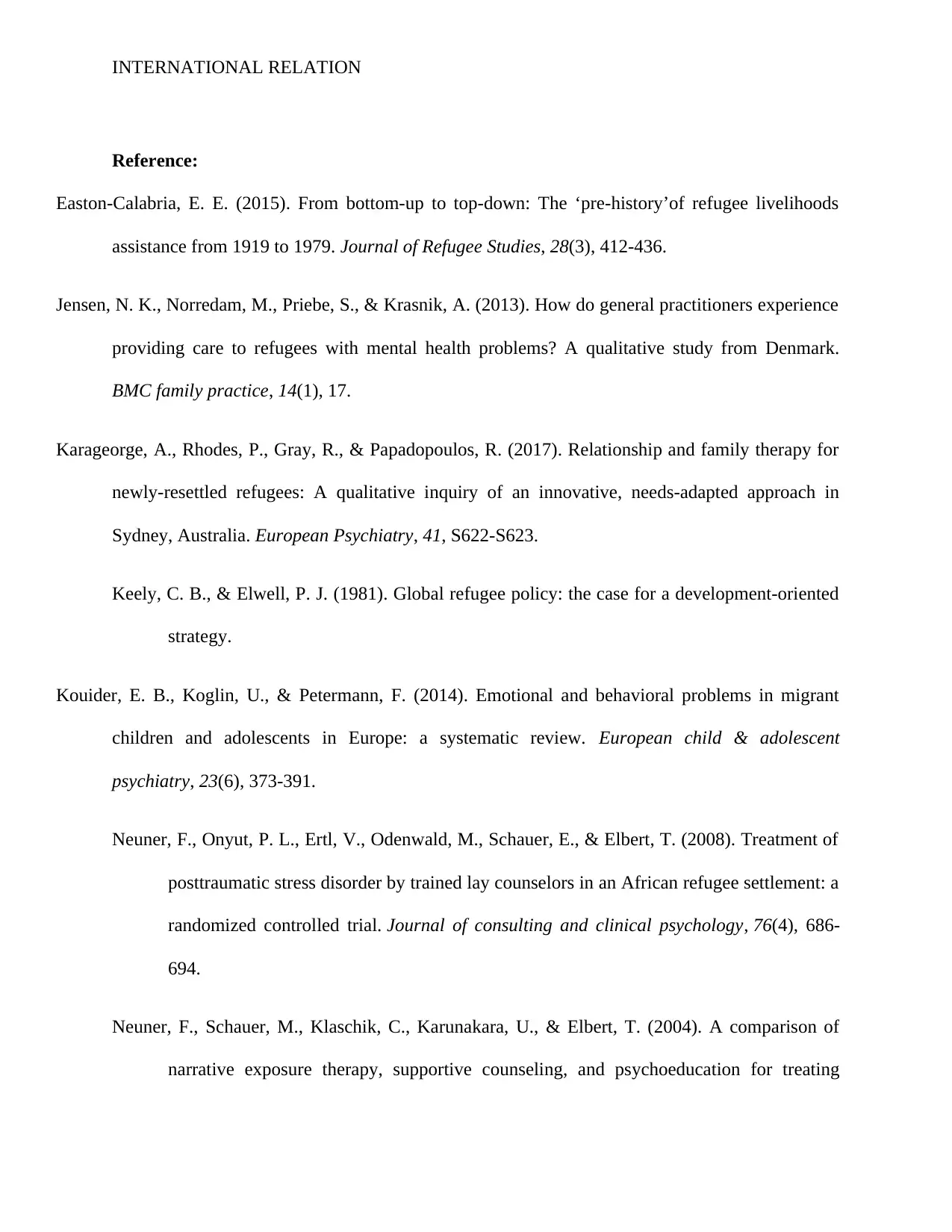
INTERNATIONAL RELATION
Reference:
Easton-Calabria, E. E. (2015). From bottom-up to top-down: The ‘pre-history’of refugee livelihoods
assistance from 1919 to 1979. Journal of Refugee Studies, 28(3), 412-436.
Jensen, N. K., Norredam, M., Priebe, S., & Krasnik, A. (2013). How do general practitioners experience
providing care to refugees with mental health problems? A qualitative study from Denmark.
BMC family practice, 14(1), 17.
Karageorge, A., Rhodes, P., Gray, R., & Papadopoulos, R. (2017). Relationship and family therapy for
newly-resettled refugees: A qualitative inquiry of an innovative, needs-adapted approach in
Sydney, Australia. European Psychiatry, 41, S622-S623.
Keely, C. B., & Elwell, P. J. (1981). Global refugee policy: the case for a development-oriented
strategy.
Kouider, E. B., Koglin, U., & Petermann, F. (2014). Emotional and behavioral problems in migrant
children and adolescents in Europe: a systematic review. European child & adolescent
psychiatry, 23(6), 373-391.
Neuner, F., Onyut, P. L., Ertl, V., Odenwald, M., Schauer, E., & Elbert, T. (2008). Treatment of
posttraumatic stress disorder by trained lay counselors in an African refugee settlement: a
randomized controlled trial. Journal of consulting and clinical psychology, 76(4), 686-
694.
Neuner, F., Schauer, M., Klaschik, C., Karunakara, U., & Elbert, T. (2004). A comparison of
narrative exposure therapy, supportive counseling, and psychoeducation for treating
Reference:
Easton-Calabria, E. E. (2015). From bottom-up to top-down: The ‘pre-history’of refugee livelihoods
assistance from 1919 to 1979. Journal of Refugee Studies, 28(3), 412-436.
Jensen, N. K., Norredam, M., Priebe, S., & Krasnik, A. (2013). How do general practitioners experience
providing care to refugees with mental health problems? A qualitative study from Denmark.
BMC family practice, 14(1), 17.
Karageorge, A., Rhodes, P., Gray, R., & Papadopoulos, R. (2017). Relationship and family therapy for
newly-resettled refugees: A qualitative inquiry of an innovative, needs-adapted approach in
Sydney, Australia. European Psychiatry, 41, S622-S623.
Keely, C. B., & Elwell, P. J. (1981). Global refugee policy: the case for a development-oriented
strategy.
Kouider, E. B., Koglin, U., & Petermann, F. (2014). Emotional and behavioral problems in migrant
children and adolescents in Europe: a systematic review. European child & adolescent
psychiatry, 23(6), 373-391.
Neuner, F., Onyut, P. L., Ertl, V., Odenwald, M., Schauer, E., & Elbert, T. (2008). Treatment of
posttraumatic stress disorder by trained lay counselors in an African refugee settlement: a
randomized controlled trial. Journal of consulting and clinical psychology, 76(4), 686-
694.
Neuner, F., Schauer, M., Klaschik, C., Karunakara, U., & Elbert, T. (2004). A comparison of
narrative exposure therapy, supportive counseling, and psychoeducation for treating
Paraphrase This Document
Need a fresh take? Get an instant paraphrase of this document with our AI Paraphraser
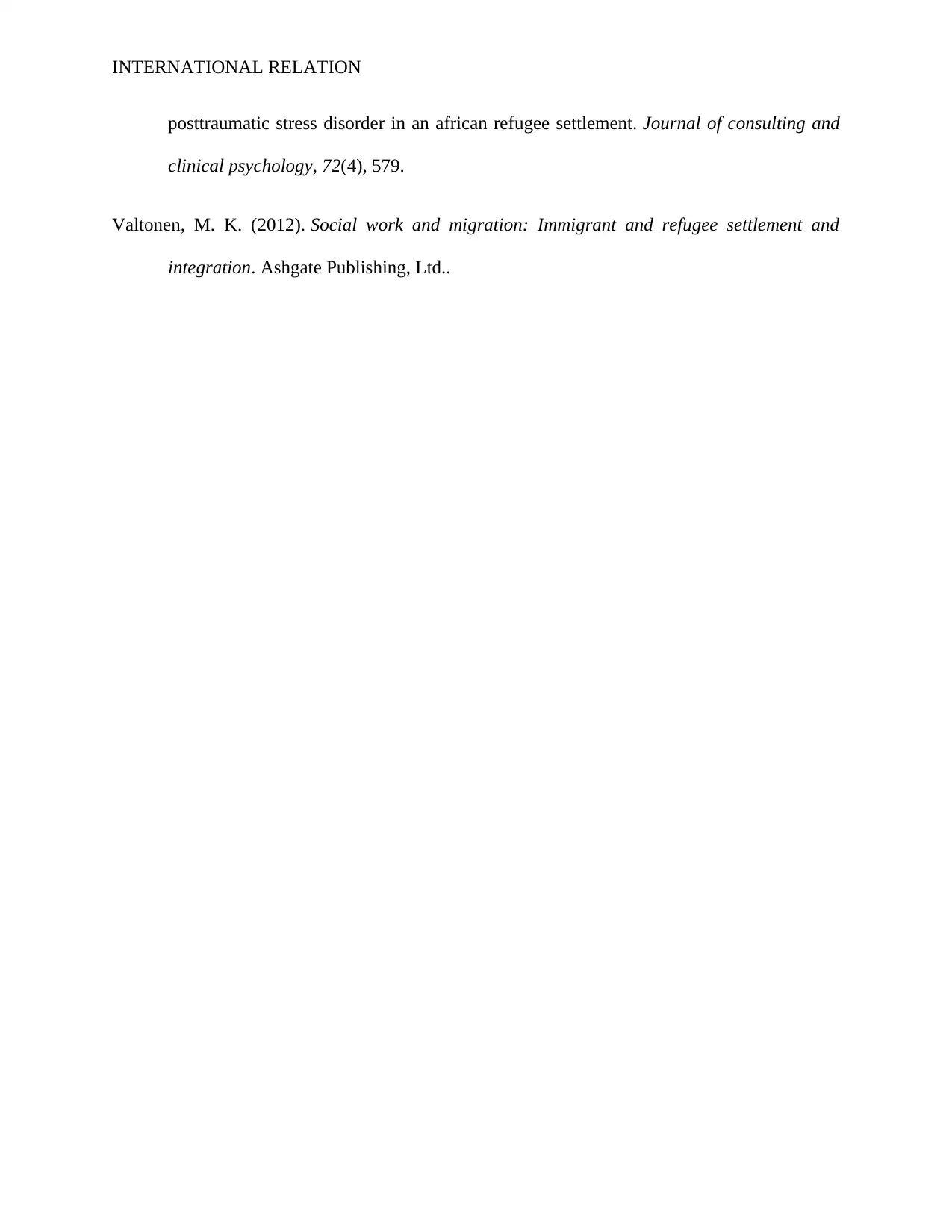
INTERNATIONAL RELATION
posttraumatic stress disorder in an african refugee settlement. Journal of consulting and
clinical psychology, 72(4), 579.
Valtonen, M. K. (2012). Social work and migration: Immigrant and refugee settlement and
integration. Ashgate Publishing, Ltd..
posttraumatic stress disorder in an african refugee settlement. Journal of consulting and
clinical psychology, 72(4), 579.
Valtonen, M. K. (2012). Social work and migration: Immigrant and refugee settlement and
integration. Ashgate Publishing, Ltd..
1 out of 8
Related Documents
Your All-in-One AI-Powered Toolkit for Academic Success.
+13062052269
info@desklib.com
Available 24*7 on WhatsApp / Email
![[object Object]](/_next/static/media/star-bottom.7253800d.svg)
Unlock your academic potential
Copyright © 2020–2026 A2Z Services. All Rights Reserved. Developed and managed by ZUCOL.





